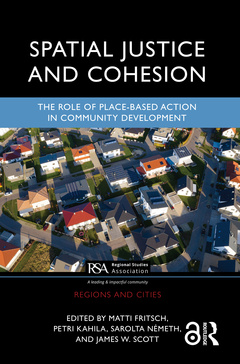Spatial Justice and Cohesion The Role of Place-Based Action in Community Development Regions and Cities Series
Coordonnateurs : Fritsch Matti, Kahila Petri, Németh Sarolta, Scott James W.

Place-based strategies are widely discussed as powerful instruments of economic and community development. In terms of the European debate, the local level ? cities, towns and neighbourhoods ? has recently come under increased scrutiny as a potentially decisive actor in Cohesion Policy. As understandings of socio-spatial and economic cohesion evolve, the idea that spatial justice requires a concerted policy response has gained currency.
Given the political, social and economic salience of locale, this book explores the potential contribution of place-based initiative to more balanced and equitable socio-economic development, as well as growth in a more general sense. The overall architecture of the book and the individual chapters address place-based perspectives from a number of vantage points, including the potential of achieving greater effectiveness in EU and national level development policies, through a greater local level and citizens' role and concrete actions for achieving this; enhancing decision-making autonomy by pooling local capacities for action; linking relative local autonomy to development outcomes and viewing spatial justice as a concept and policy goal. The book highlights, through the use of case studies, how practicable and actionable knowledge can be gained from local development experiences.
This book targets researchers, practitioners and students who seek to learn more about place-based based development and its potentials. Its cross-cutting focus on spatial justice and place will ensure that the book is of wider international interest.
The Open Access version of this book, available at www.taylorfrancis.com, has been made available under a Creative Commons Attribution-Non Commercial-No Derivatives (CC-BY-NC-ND) 4.0 license. Funded by The University of Eastern Finland.
1. Introduction to the book: the role of place-based action in improving spatial justice and cohesion. Part 1 Cohesion and the Role of Localities: Research and Policy Debates. 2. The localities approach: (European) cohesion, spatial justice and the development role of place. 3. Spatial justice and locality: The conceptual framework and application. Part 2 Spatial Justice in Local Development. 4. Approaching spatial justice in local actions: a European comparative perspective on promoters, inhibitors, and achievements. 5. Stigmatization and cultural foundations of spatial injustice. 6. Drivers of place-based community development: perceptions of spatial injustice and the role of institutionally embedded responses. 7. Towards spatial justice across Europe through place-based interventions: lessons learned from considering medium-horizon future scenarios. 8. The RELOCAL case studies approach. Part 3 Urban Case Studies. 9. Innovation and governance to halt urban fragmentation: the case of the commission for a socially sustainable Stockholm. 10. PLACE/Ladywell housing project, London: a temporary local project with metropolitan impacts. 11. Incomplete justice is no justice: l earning from the neoliberal and elitist planning experiences of Euralens and EPA Alzette-Belval. Part 4 Rural Case Studies. 12. Polarization, centralization, and place-based policies in Greece. 13. The struggle against territorial disadvantage in a peripheral Finnish town: balancing effectiveness and accountability in local government. 14. Autonomy and LEADER: a comparative study of three local action groups. Part 5 Conclusions and Policy Considerations. 15. Conclusions and policy considerations – what does local experience tell us?
Matti Fritsch is a Senior Researcher in the Faculty of Social Sciences and Business Studies at the Karelian Institute of the University of Eastern Finland.
Petri Kahila is an Adjunct Professor of Economic Geography and the Director of the Karelian Institute of the University of Eastern Finland.
Sarolta Németh is Project Researcher at the Karelian Institute of the University of Eastern Finland.
James W. Scott is a Researcher in Regional and Border Studies at the Karelian Institute of the University of Eastern Finland.
Date de parution : 09-2023
15.6x23.4 cm
Thèmes de Spatial Justice and Cohesion :
Mots-clés :
Spatial justice; cohesion; territorial development; European Cohesion Policy; regional and local autonomy; place-based development; LEADER; CCLD; Local Development; Spatial Injustice; EU Cohesion Policy; Civil Society; RELOCAL Project; Territorial Cohesion; Procedural Justice; Central Government; Lag; Public Administration; Local Development Actions; RELOCAL Case; Local Knowledge; EU Policy; EU Structural Fund; EU Member State; Case Study Researchers; Higher Governance Levels; Place; Spatial Inequalities; Development Leaders; Lewisham Council; Lewisham High Street; Stockholm Stad
